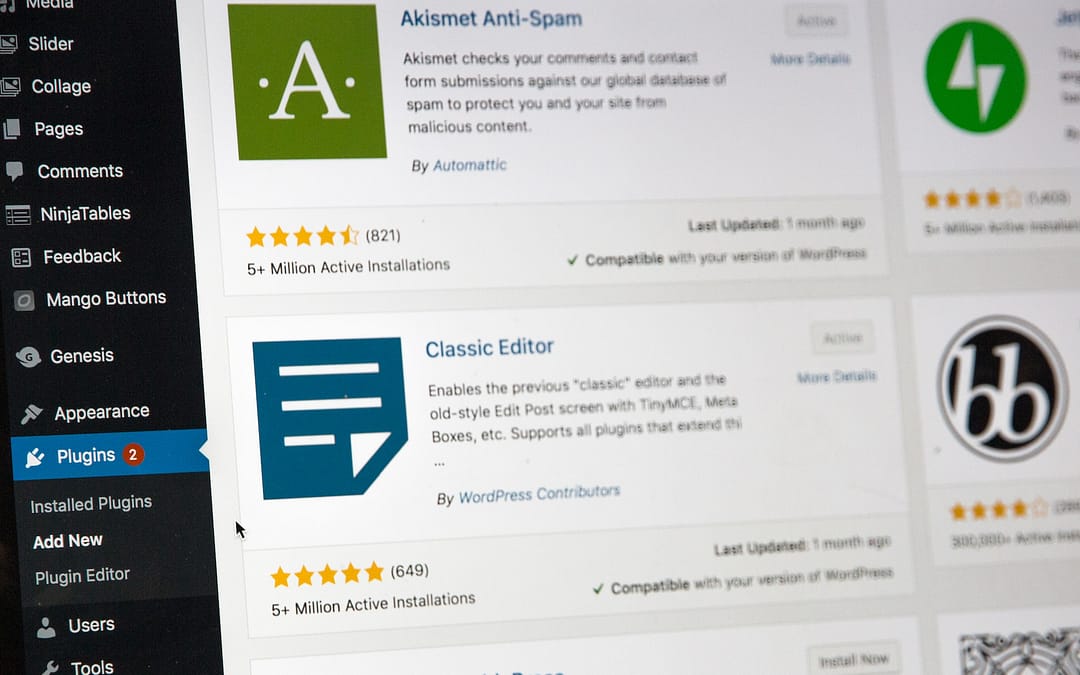
Uncategorized
In the ever-expanding online world, having a strong online presence is vital for businesses and individuals alike. When it comes to building and optimizing your website, WordPress is a popular and powerful platform. However, merely creating a website is not enough; you need to ensure it gets noticed by search engines and ranks high in search results. This is where Search Engine Optimization (SEO) comes into play WordPress SEO.
Essential WordPress SEO techniques to help you boost your website’s ranking
Choose a Reliable Hosting Provider: Your website’s performance plays a crucial role in SEO. Opt for a reliable hosting provider that offers excellent server uptime and speed. A slow-loading website can negatively impact user experience and search rankings.
Optimize Your Permalink Structure: The permalink structure determines how your URLs appear. Go to your WordPress settings and choose a URL structure that includes the post title. This makes your URLs more descriptive and SEO-friendly.
Install an SEO Plugin: WordPress offers various WordPress SEO plugins that simplify the optimization process. Yoast SEO and All in One SEO Pack are popular choices. These plugins help you optimize meta tags, sitemaps, and other essential elements.
Conduct Keyword Research: Keyword research is the foundation of effective SEO. Identify relevant keywords and phrases your target audience is likely to use. Tools like Google Keyword Planner and Ubersuggest can assist you in finding valuable keywords.
Create High-Quality Content: Content is king in WordPress SEO. Craft informative, engaging, and original content that addresses the needs of your audience. Use your researched keywords strategically within your content.
Optimize Title Tags and Meta Descriptions: Title tags and meta descriptions appear in search results. Ensure they are compelling and contain your primary keyword. SEO plugins make it easy to customize these elements.
Use Header Tags Properly: Header tags (H1, H2, H3, etc.) structure your content and make it easier for search engines to understand your page’s hierarchy. Include your target keywords in relevant header tags.
Improve Site Navigation: A well-organized site structure enhances user experience and helps search engines crawl your website more efficiently. Use clear menus and categories to make navigation easy.
Optimize Images: Compress and resize images to improve website speed. Add descriptive alt text to your images to make them more accessible to visually impaired users and search engines.
Focus on Mobile-Friendly Design: With the majority of users accessing the internet on mobile devices, having a responsive website is crucial. Google prioritizes mobile-friendly sites in search results.
Secure Your Website with HTTPS: A secure website (HTTPS) is not only essential for user trust but also influences WordPress SEO rankings. Obtain an SSL certificate to encrypt data and secure your website.
Build Quality Backlinks: Backlinks from reputable and relevant websites can significantly boost your WordPress SEO efforts. Focus on creating valuable content that naturally attracts backlinks.
Utilize Internal Linking: Internal linking helps search engines understand the structure of your website and the importance of different pages. Link relevant pages together to improve user experience and WordPress SEO.
Regularly Update and Refresh Content: Search engines love fresh content. Regularly update and refresh your content to keep it relevant and appealing to both users and search engines.
Monitor Website Performance: Use tools like Google Analytics and Google Search Console to track your website’s performance. Analyze user behavior, traffic sources, and search queries to identify areas for improvement.
Submit an XML Sitemap: An XML sitemap is a roadmap of your website for search engines. Submit it to Google Search Console to ensure all your pages are indexed correctly.
Avoid Duplicate Content: Duplicate content can harm your SEO efforts. Use canonical tags or implement proper redirects to consolidate duplicate URLs.
Leverage Social Media: Social media can amplify your content’s reach and increase traffic to your website. Share your posts on relevant social platforms to engage with your audience.
Monitor Competitors: Keep an eye on your competitors’ SEO strategies to gain insights and stay ahead in the game. Analyze their keywords, backlinks, and content approach.
Regularly Audit Your SEO Efforts: SEO is an ongoing process. Regularly audit your website’s performance and SEO strategies to identify what works and what needs improvement.
By following these practical WordPress SEO techniques, you can optimize your website for better search engine rankings and attract more organic traffic. Remember, SEO is not a one-time task but a continuous effort to stay relevant and competitive in the online landscape. Invest time and effort into understanding your audience’s needs, creating valuable content, and implementing the right SEO practices to achieve long-term success for your WordPress website.

Uncategorized
Welcome to our website, where we uncover the hidden power of long-tail keywords and how they can significantly boost your search traffic. While many people focus on generic, highly competitive keywords, the real treasure lies in the long-tail keywords that can drive targeted and high-converting traffic to your website. In this article, we will delve into what long-tail keywords are, why they are essential for SEO success, and how you can leverage them to attract a flood of search traffic to your website.
What are Long-Tail Keywords?
Long tail keywords are specific, longer phrases that users enter into search engines when they are looking for particular information or products. Unlike broad keywords, long-tail keywords are more focused and less competitive. They typically have a lower search volume but higher intent, making them extremely valuable for attracting visitors who are more likely to convert into customers.
Why Long-Tail Keywords Matter:
Targeted Traffic: Long tail keywords allow you to target specific niches and cater to the specific needs of your audience. By incorporating these keywords into your content, you can attract visitors who are actively searching for the products or services you offer.
Less Competition: Generic keywords are often highly competitive, making it challenging to rank well in search engine results. Long tail keywords, on the other hand, have less competition, giving you a better chance to rank higher and gain visibility.
Higher Conversion Rates: Long tail keywords are more indicative of user intent. When someone uses a specific phrase in their search query, it shows that they are looking for something specific. By optimizing your content for relevant long tail keywords, you increase the likelihood of attracting visitors who are ready to take action, resulting in higher conversion rates.
How to Identify Long-Tail Keywords:
Keyword Research: Start by conducting comprehensive keyword research using tools like Google Keyword Planner, SEMrush, or Ahrefs. Look for longer phrases related to your niche and pay attention to search volume and competition metrics.
User Intent: Put yourself in the shoes of your target audience. What questions or problems might they have? Understanding the intent behind their search queries will help you uncover valuable long-tail keywords that align with their needs.
Competitor Analysis: Analyze your competitors’ websites to identify the keywords they are ranking for. This can provide insights into potential long-tail keywords that you might have missed.
Optimizing Your Content with Long-Tail Keywords:
Incorporate Keywords Naturally: Once you have identified relevant long tail keywords, incorporate them naturally into your website’s content. Avoid keyword stuffing, as it can harm your rankings. Focus on creating high-quality, informative content that provides value to your audience.
Title Tags and Meta Descriptions: Optimize your title tags and meta descriptions by including long-tail keywords. This helps search engines understand the relevance of your content and encourages users to click through to your website.
Create Targeted Landing Pages: Develop landing pages tailored to specific long tail keywords. This allows you to provide highly relevant content and increase the chances of ranking higher in search results for those specific keywords.
Conclusion: Long tail keywords are a powerful SEO strategy that can significantly impact your website’s search traffic. By targeting specific phrases and catering to user intent, you can attract highly engaged visitors who are more likely to convert into customers. Take the time to conduct thorough keyword research, optimize your content, and create a user-friendly experience that aligns with the needs of your target audience. Embrace the ‘secret’ of long tail keywords and unlock the potential for TONS of search traffic to your website.

Uncategorized
The title tag is a crucial element of on-page SEO that plays a significant role in determining your website’s visibility in search engine results. Crafting a perfect SEO title tag involves creating a concise and compelling headline that accurately represents the content of your webpage while incorporating relevant keywords. In this article, we will guide you through the process of creating an effective SEO title tag that improves search engine rankings and attracts organic traffic.
Steps to create an SEO title tag
Understand the Purpose of a Title Tag: A title tag is an HTML element that defines the title of a webpage. It appears as a clickable headline in search engine results and is also displayed at the top of a web browser’s window. The primary purpose of a title tag is to provide a concise and accurate summary of the content on your webpage. It helps search engines understand the context and relevance of your page and influences the click-through rate (CTR) of users.
Incorporate Relevant Keywords: Keywords are the foundation of an effective SEO title tag. Identify the primary keyword or key phrase that best represents the content of your webpage. Conduct keyword research using tools like Google Keyword Planner, SEMrush, or Ahrefs to discover relevant keywords with high search volume and low competition. Incorporate your primary keyword naturally in the title tag to optimize it for search engines.
Keep it Concise and Compelling: The ideal length for an SEO title tag is between 50-60 characters to ensure it is fully displayed in search engine results. Craft a concise and compelling headline that grabs the attention of users and encourages them to click through to your webpage. Include the primary keyword near the beginning of the title tag, as search engines typically give more weight to keywords at the beginning of a title.
Maintain Relevance and Accuracy: Your SEO title tag should accurately represent the content of your webpage. Avoid using misleading or clickbait titles that do not align with the actual content. Such practices can lead to a high bounce rate and negatively impact your website’s credibility. Ensure that your title tag reflects the core topic or purpose of your webpage, providing a clear and honest representation of what users can expect to find.
Appeal to Users’ Intent: Consider the intent behind the search queries users might use to find your webpage. Are they looking for information, products, or solutions? Tailor your title tag to align with the user’s intent and address their needs. Incorporate descriptive words or phrases that emphasize the value proposition or unique selling points of your webpage. By appealing to users’ intent, you increase the likelihood of attracting qualified organic traffic.
Avoid Keyword Stuffing: While it’s essential to include relevant keywords in your title tag, avoid keyword stuffing at all costs. Keyword stuffing refers to the practice of overloading the title tag with excessive keywords in an attempt to manipulate search engine rankings. This tactic is frowned upon by search engines and can result in penalties. Instead, focus on creating a title tag that reads naturally and provides value to users.
A/B Testing and Optimization: The effectiveness of your SEO title tag can be enhanced through continuous testing and optimization. Conduct A/B tests by creating multiple versions of your title tag and analyzing their performance. Monitor metrics such as CTR, bounce rate, and time on the page to determine the impact of different title tags. Experiment with variations of keywords, phrasing, or value propositions to find the most compelling title tag that resonates with your audience.
Crafting the perfect SEO title tag requires a strategic approach that combines keyword optimization, conciseness, relevance, and appeal to users’ intent. By incorporating relevant keywords naturally, keeping the title tag concise and compelling, maintaining accuracy, appealing to users’ intent, avoiding keyword stuffing, and conducting A/B testing for optimization, you can create an effective title tag that improves your website’s visibility in search engine results. Remember that an optimized title tag is just one element of a comprehensive SEO strategy, so continue to focus on providing valuable content and optimizing other on-page and off-page elements for long-term success.

Uncategorized

Uncategorized
Kolkata, the cultural capital of India, is witnessing a rapid rise in the demand for digital marketing services. As businesses in Kolkata recognize the power of a strong online presence, finding the right digital marketing agency becomes essential. In this article, we present the top 10 digital marketing agencies in Kolkata, along with their names, services, and information. Let’s explore these agencies that can help businesses achieve remarkable online success in the vibrant city of Kolkata.
The Top 10 Best Digital Marketing Agencies in Kolkata
DigitalCrave: DigitalCrave is an innovative and one of the top digital marketing agencies that help businesses establish a strong online presence and drive growth. They deliver comprehensive solutions tailored to each client’s unique needs with their expertise in search engine optimization (SEO), social media marketing, PPC advertising, and more. With their client-centric approach and commitment to excellence.
WebGuru Infosystems: WebGuru Infosystems is a leading digital marketing agency offering a comprehensive range of services, including search engine optimization (SEO), social media marketing, pay-per-click (PPC) advertising, content marketing, and web design. With over 15 years of experience and a client-centric approach, WebGuru Infosystems helps businesses in Kolkata establish a strong online presence and drive growth.
DISCLAIMER: All the digital marketing agencies and the information listed were taken from various sources on the internet and can be changed at the agency’s convenience. It’s always recommended to conduct thorough research, review recent client feedback, and evaluate the services offered by each agency before making a decision.
Seven Boats: Seven Boats is a dynamic digital marketing agency that specializes in SEO, social media marketing, content creation, web development, and online reputation management. They provide innovative strategies and customized solutions to help businesses in Kolkata connect with their target audience and achieve their marketing goals.
Carney Technologies Services: Carney Technologies Services is a reputed digital marketing agency offering services such as SEO, social media marketing, content marketing, web design, and development. With their expertise and customer-focused approach, Carney Technologies Services helps businesses in Kolkata enhance their online visibility and drive success.
Insync: Insync is a creative digital marketing agency known for its expertise in SEO, social media marketing, web design, and development. They offer tailored solutions and innovative strategies that help businesses in Kolkata stand out in the digital landscape and drive growth.
Orange Digital Media: Orange Digital Media is a full-service digital marketing agency providing services like SEO, social media marketing, content creation, web development, and online advertising. With their creative approach and commitment to excellence, Orange Digital Media helps businesses in Kolkata amplify their online presence and achieve remarkable results.
Indus Net Technologies: Indus Net Technologies is a performance-driven digital marketing agency specializing in SEO, pay-per-click (PPC) advertising, social media marketing, web development, and e-commerce solutions. Their data-driven strategies and industry expertise help businesses in Kolkata achieve their marketing objectives and maximize their online potential.
Techshu Digital: Techshu Digital is a trusted digital marketing agency offering a range of services, including SEO, social media marketing, content marketing, web design, and development. They focus on creating innovative strategies and delivering measurable results for businesses in Kolkata.
Uplers: Uplers is a global digital marketing agency that provides services like SEO, pay-per-click (PPC) advertising, social media marketing, content creation, web development, and email marketing. With their vast experience and a team of experts, Uplers helps businesses in Kolkata drive growth and achieve online success.
Reddensoft Infotech: Reddensoft Infotech is a creative digital marketing agency specializing in SEO, social media marketing, web design, and development. They offer customized solutions that align with client’s objectives and help businesses in Kolkata establish a strong digital presence.
Conclusion:
In the vibrant city of Kolkata, these top 10 digital marketing agencies play a crucial role in helping businesses establish a strong online presence and drive remarkable growth. Whether it’s SEO, social media marketing, content creation, or web development, these agencies offer a diverse range of services tailored to meet the unique needs of businesses in Kolkata. By partnering with these leading agencies, businesses can leverage their expertise, creative approaches, and industry insights to navigate the competitive digital landscape and achieve exceptional online success in Kolkata.





